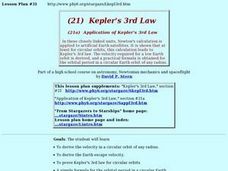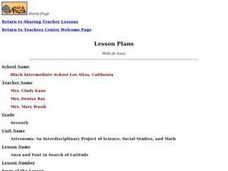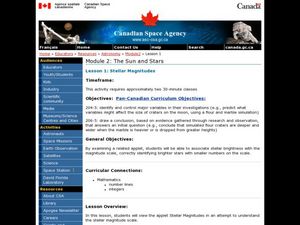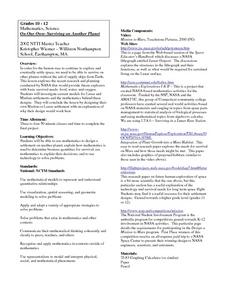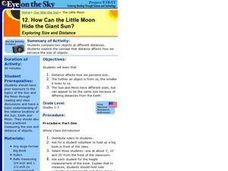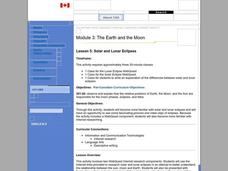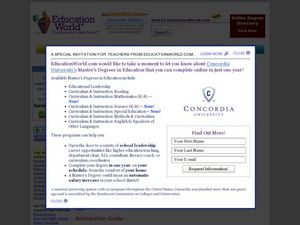Curated OER
Kepler's 3rd Law
Students derive the velocity in a circular orbit of any radius. They derive the Earth escape velocity and prove Kepler's 3rd law for circular orbits # A simple formula for the orbital period in a circular Earth orbit of given radius.
Curated OER
Anza and Font in Search of Latitude
This is an integrated lesson that incorporates Social Studies, Science, and Mathematics. In Social Studies, 7th graders complete an online interview and complete an online worksheet about latitude of sites on the Anza trail. In Science...
Curated OER
Solar System: Let's Take a Trip
Third graders consider outer space. In this introductory solar system lesson, 3rd graders complete a KWL chart and listen to the story The Magic School Bus: Lost in the Solar System, by Joanna Cole & Bruce Degen. They will contribute...
Curated OER
Planet Interiors
Students compare and contrast the Earth's interior with 2 other planets by looking at images on the computer. In this planet interiors lesson plan, students write a paper about their findings.
Curated OER
The Milky Way and Beyond
Learners consider the scale of the Milky Way Galaxy. In this Milky Way lesson, students hypothesize the length of time necessary to cross the Milky Way.
Curated OER
Stellar Magnitudes
Middle schoolers analyze the stellar magnitude scale. In this stellar magnitude lesson, students examine the stellar magnitude scale. Middle schoolers predict the Sun's magnitude from various planets.
Curated OER
Exploring the Planets
Sixth graders explore the planets through an interactive web site. In this astronomy based lesson, 6th graders compare planets, explore comets, and discover planet facts through a variety of activities provided by the Smithsonian Museum.
Curated OER
Star Child Astronomy
Students gain understanding of the relationship of Earth within the Solar System. They increase knowlegde of the planets, sun, moon, meteoroids, asteroids and comets.
Curated OER
Use of Lasers
Students explore the use of lasers. In this "lasers" science and career education lesson, students search the Internet to find uses for lasers and make a list of companies that use or produce lasers. Students complete a lasers and making...
Curated OER
Sky Watching
Students complete night-sky observations to understand how our knowledge of the sky has been enhanced by telescopes. Students complete a timeline worksheet giving the history of telescopes. Students then then make their own observations...
Curated OER
On Our Own- Surviving on Another Planet
Students investigate current models for Lunar and Martian settlements and study the mathematics behind these designs. They design their own Lunar or Martian settlement with an explanation of why their model would work best.
Curated OER
How Can the Little Moon Hide the Giant Sun? Exploring Size and Distance
Students compare two objects at different distances. They explore the concept that distance affects how we perceive the size of objects.
Curated OER
Gravity Launch
Pupils use an online interactive to launch a rocket from earth. They have control over the angle and thrust of the rocket to discover the relationship between the two.
Curated OER
How Do Things Fall?
Students study forces by examining the force of gravitational attraction. They observe how objects fall and measure the force of gravitational attraction upon objects. Students discover that, since gravitational constants are different...
Curated OER
Gravity Versus The Mighty Egg - Biology Teaching Thesis
Students are able to describe the principles of gravity. They name other places in the real world where we compensate for gravity. Students design a shock absorber with limited materials and explain how it works to protect an egg. They...
Curated OER
Mass, Volume, and Weight
Students explore mass, volume, and weight. In this science and measurement lesson plan, students compare volume, mass, and weight after listening to the teacher's description of each. Students explore different scales and balances and...
Curated OER
Night Sky
Students discover why stars can only be seen at night. They participate in a read aloud of, "Night Sky" by Carole Stott and, "Switch on the Night" by Ray Bradbury. Using the sky objects described in the readings, they brainstorm and list...
Curated OER
Solar and Lunar Eclipses
Learners complete a WebQuest in order to better explain solar and lunar eclipses. They observe images and videos of eclipses from around the world.
Curated OER
Where Is Saturn in the Solar System? Where Am I in the Solar System?
Students engage in a solar system activity, In this activity, students will read aloud as a class about the solar system. The students will then listen to the teacher read a solar system book prior to filling out a worksheet about...
Curated OER
Being Nosy About Our Neighbors
Students use the scientific method to explore the effect of size on impact cratering. They compare images of landforms on Earth to those of other planets to compare surface processes. Students infer the geologic history of another...
Curated OER
How Do We Explore Strange Environments?
Students identify and label the different parts of a robot, rover, or a spacecraft. They discuss and record all of the features their robot will need to accomplish its mission and be able to explain why they chose these features to...
Curated OER
New Year Celebrations Around the World
Students share their New Year's traditions, then read a news article about how people around the world celebrate the start of a new year. In this current events lesson, the teacher introduces the article with a discussion and vocabulary...
Curated OER
Weight A Minute
Students watch a video and engage in hands-on activities which introduce scientific information made real through re-cognition and understanding the phenomena of gravitational force and how it impacts life on our planet.
Curated OER
Ask an Astronaut
Students read what questions have already been asked from the archives. They then categorize what is already known (each student should be able to give a question which has already been asked and answered), what they would like to know,...


